- Home
- David Eddings
Polgara the Sorceress Page 22
Polgara the Sorceress Read online
Page 22
I stepped over to where the Rivan Warder stood. ‘Send the rest of them away, Kamion,’ I advised him. ‘We’ve found the one we want.’
Kamion was staring incredulously at the rosy Orb. ‘Was that supposed to happen, Pol?’ he asked, his voice a little strangled.
‘Of course,’ I replied in an off-hand sort of way. ‘You didn’t think we were just going to have all those girls draw straws, did you?’ Then I stepped down from the dais and approached the bride-to-be. ‘Good morning, Larana,’ I greeted her.
‘Lady Polgara,’ she responded with a graceful curtsey.
‘Why don’t you come with me, dear?’ I said.
‘But – ’ she looked at Daran with an almost naked longing.
‘You’ll have time to talk with him later, dear,’ I assured her. ‘Lots of time, I’d imagine. There are some things you’ll need to know, so let’s get them out of the way right at the outset.’ I firmly took our bride-to-be by the arm and led her toward the door.
‘Aunt Pol.’ Daran’s voice almost had a note of panic in it.
‘Later, dear,’ I told him. ‘Why don’t you and Lord Brand go to our meeting room? Larana and I’ll be along in a little while.’
I took Larana to my rooms, sat her down, and gave her a cup of tea to settle her nerves. Then I told her in rather general terms something about the peculiar family she’d soon be joining.
‘I thought all those stories were just that, Lady Polgara – stories. Are you saying that they’re all really true?’
‘They’ve probably been exaggerated a bit, dear,’ I said, ‘but they’re still more or less true.’
‘Does the prince know? That I’ve been selected, I mean?’
‘Oh, dear, dear Larana,’ I laughed. ‘Didn’t you see his face? Right now he’d walk through fire just to get to you.’
‘But I’m so ordinary.’
‘No, dear,’ I said firmly. ‘You’ve never been ordinary, and you never will be. Drink your tea now, and then we’ll join the menfolk.’
She set down her cup. ‘Shouldn’t we hurry, Lady Polgara?’ she asked. ‘I wouldn’t want him to get away.’
‘Not to worry, dear. He’s not going to get away from you. Let him wait just a bit. It’ll be good for him.’
When the two of us joined Kamion and Daran in the blue-draped tower room, I was treated to a repetition of that day in the inn at Camaar when my sister and Riva first met.
‘Aren’t they going to say anything to each other, Pol?’ Kamion whispered to me after about half an hour of absolute silence.
“They are saying things to each other, Kamion. Listen with your eyes, not your ears.’
He looked at the happy couple and saw the absolute adoration on their faces. ‘I think I see what you mean, Pol. It’s almost embarrassing to be in the same room with them.’
‘Yes,’ I agreed. Then I looked speculatively at Larana. ‘You’d better give me about ten days before you schedule the wedding, Kamion. I have to have a long talk with Arell about Larana’s wedding dress and a few other details.’
‘It’s all settled then? That quick? My courtship went on for half a year or more.’
I patted his cheek. ‘This is more efficient, dear boy,’ I told him. ‘You’ll probably have to make most of the decisions here on the Isle for the next couple of months. Daran’s not going to be very rational for a while. Oh, you’d better talk with Riva and let him know what’s afoot. He’ll have to be present, of course, and we’ll want to give him time to prepare himself to appear in public again.’
‘That might be a little tricky, Pol. He’s become very reclusive in the past year. If I didn’t know better, I’d almost say that he’s afraid of people.’
‘Let him know what’s happening, Kamion, and then I’ll talk with him.’
Kamion looked at the children again. “The next problem is how we’re going to get those two apart. Besides, it’s starting to get dark outside, and we should probably feed them.’
‘They aren’t hungry, Kamion. Give them another couple of hours, and then I’ll take Larana to my quarters for the night.’
‘Be sure to lock your door. Keeping Daran and Larana away from each other might be just a bit difficult.’
‘I’ll take care of it, Brand. Send for Arell, would you, please? Tell her that I’ll need her first thing in the morning.’ Then I went over to where the children were still gazing into each others’ eyes. ‘Did you ask her yet, Daran?’ I said, shaking his shoulder to get his attention.
‘Ask her what, Aunt Pol?’
I gave him a long, steady look.
He flushed slightly. ‘Oh,’ he said, ‘that. It’s not really necessary, Aunt Pol.’
‘Why don’t you do it anyway, Daran? These little formalities are the very soul of civilized behavior.’
‘Well, if you think I should. It’s already been decided, though.’ He looked at the young woman who’d fill the rest of his life. ‘You will, won’t you, Larana?’ he asked.
‘Will what, my Lord?’ she replied.
‘Marry me, naturally.’
‘Oh,’ she said, ‘that. Of course I will, my Lord.’
‘See?’ I said. ‘Now that wasn’t so difficult, was it?’
There had been cries of outraged anguish from those girls who’d been waiting to meet the Crown Prince and then had been summarily dismissed, and Kamion and I were besieged by equally outraged fathers vehemently protesting – not so much the disappointment of their daughters as the evaporation of their own opportunities for social prestige and access to the throne. But Kamion and I were able to smooth all the ruffled feathers with mysterious references to ‘fate’, ‘destiny’, and ‘preordination’. Our arguments were a bit specious, I’ll admit, but convincing lies are the very soul of diplomatic discourse.
Arell quite nearly outdid herself with Larana’s wedding gown, a lacy fantasy in palest blue. Larana and I really hit it off when she confided to me that blue was her favorite color. I wholeheartedly approved of the girl’s good taste.
The wedding took place about noon on a sunny spring day, and the Hall of the Rivan King, suitably decorated for the happy occasion, was flooded with bright sunlight.
I’m not entirely sure who arranged that. I know that I didn’t.
There was the usual banquet after the wedding, but I’d visited the brewery before dawn and made some modifications in the favorite beverage of every Alorn who’s ever lived. The beer tasted like beer, and it looked and smelled exactly like beer, but it didn’t produce the usual results. The wedding guests, as wedding guests always do, drank to excess, but nothing happened. There were no arguments, no fights, no falling down, no snoring in corners, and no throwing up. There were some monumental headaches the following morning, however. I was certainly not cruel enough to take all the fun out of drinking too much.
After the ceremony had taken place, I spent most of the rest of the day with my brother-in-law. Riva Iron-grip’s hair was almost snow-white by now, and he seemed to be in failing health. ‘It’s almost all finished now, isn’t it, Pol?’ he said a bit sadly.
‘I didn’t exactly follow that, Riva.’
‘My work’s almost all done, and I’m very tired. As soon as Larana produces an heir, I’ll be able to rest. Would you do me a favor?’
‘Of course.’
‘Have some workmen build a new crypt for Beldaran and me. I think we should sleep beside each other.’
The natural response to such a request would be to scoff with such idiocies as, ‘You aren’t going to need a burial place for a long time,’ and the like, but I loved and respected Iron-grip too much to insult him that way. ‘I’ll see to it,’ I promised.
‘Thank you, Pol,’ he said. ‘Now, if you don’t mind, I think I’ll go to bed. It’s been a hectic day, and I’m very, very tired.’ Then he rose and with stooped shoulders, he quietly left the banquet hall.
Things went along smoothly on the Isle for several years after the wedding. There was a certain concern
about the fact that Larana didn’t immediately blossom into motherhood, but I calmed everyone as best I could. ‘These things take time,’ I said.
I said it so often that I got sick of hearing it myself.
Then, in 2044 by the Alorn calendar, Cherek Bear-shoulders died, plunging all of Aloria into mourning. Cherek had been a titan, and his death left a huge vacancy.
That winter, Larana quietly advised us that she was with child, and we were all moderately thrilled by the news. Her son was born the following summer, and Daran named him Cherek, in honor of his deceased paternal grandfather. After the ceremony when the infant’s hand was placed on the Orb and it responded in the usual way, we took him to Riva’s quarters to allow the king to see his grandson.
‘It’s all right, isn’t it, father?’ Daran asked, ‘naming him after your father, I mean?’
‘Father would be pleased,’ Riva said, his voice sounding very weary. He reached out, and I handed his grandson to him. He held the baby for quite some time with a gentle smile on his aged face. Then he drifted off to sleep.
He never woke up.
The funeral was solemn, but not really marred by excessive grief. Riva’s seclusion had removed him from public view, and many on the Isle were probably a bit surprised to discover that he’d still been alive.
After the funeral, I did some thinking. Daran and Kamion had things well in hand, and there was no real reason for me to remain.
And so, in the spring of 2046, I packed up all my things in preparation for my return to the Vale.
Part Three:
Vo Wacune
Chapter 12
As luck had it – although luck probably had nothing to do with it – Anrak stopped by the Isle on one of those pointless voyages of his just as I was making my preparations to leave, and he volunteered to take me as far as Camaar. I’d never really understood Anrak. About half the time he didn’t even have a cargo when he put out to sea. His arrival gave me a perfect excuse to cut short the tedious business of farewells. Why do people always drag that out so much? After you’ve said ‘goodbye’ a couple of times, you’ve said it, haven’t you?
The weather was partially cloudy when Anrak’s sailors slipped the hawsers and raised the sails, and I stood on the aft deck watching the Isle of the Winds slowly receding behind us. I’d matured on the Isle. There’d been happy times and times filled with almost unbearable grief and pain, but that’s the nature of life, isn’t it?
The rocky island was still low on the horizon astern when a peculiar certainty came over me. I’d not only said farewell to friends and relatives when I’d boarded Anrak’s ship, but I’d also said goodbye to what most people would call a normal life. I was forty-six years old now, and if the lives of my father and my uncles were any indication of what lay ahead of me, I was entering unexplored country. I would come to know and love people and then watch them drop away one by one while I went on. There was a dreadful kind of loneliness implicit in that realization. Others would leave, but I would continue on down through all the uncertain, endless years stretching out before me.
‘Why so sad, Pol?’ Anrak, who was standing at the tiller not far away, asked me.
‘No particular reason.’
‘We’ll hit open water soon,’ he assured me. ‘That should make you feel better.’ He looked out at shafts of sunlight moving majestically across the water.
‘I didn’t exactly follow that, Anrak.’
‘She’ll wash off your melancholy. She’s very good at that.’
‘She? She who?’
‘The sea, Pol. No matter how bad things get, she always takes the sorrow away and clears your head. Landsmen don’t understand that, but we do.’
‘You love the sea, don’t you, Anrak?’
‘Of course. She surprises me sometimes, and she’s occasionally bad-tempered, but most of the time she and I get along fairly well. I love her, Pol. She’s all the wife I’ve ever needed.’
I always remind myself of that conversation when I’m obliged to have dealings with that rogue, Captain Greldik. Greldik and Anrak, though separated by three thousand years, are cut from the same bolt of cloth, viewing the sea as a living thing with a personality all her own.
I bought a horse named Baron in Camaar. Baron was a good, sensible bay who was old enough to have outgrown that silliness so characteristic of younger horses, and he and I got along well. I wasn’t really in any hurry, so I didn’t push him, and Baron seemed to approve of that. We more or less strolled across the neat fields of southern Sendaria toward Muros. We stayed at village inns along the way, and when no inn was available, we slept outdoors. With the exception of that peculiarly cosmopolitan port at Camaar, southern Sendaria was in the domain of the Wacite Arends in those days, and I found the lilting brogue of the Wacite peasants rather charming. I didn’t find the repeated warnings of innkeepers and stablemen about robbers and outlaws on the road very entertaining, though. ‘But, me Lady,’ one officious village innkeeper warned when I told him that I was traveling alone, ‘ ‘tis fearful dangerous for a woman alone out there. Robbers be wicked men who’ll most likely want t’ take advantage of th’ fact that y’ have no protection, don’t y’ know.’
‘I can deal with them, good master innkeeper,’ I told him quite firmly. These continual warnings were starting to make me tired.
The River Camaar branched about half-way to Muros, and the land beyond that fork in the river was as thickly forested as northern Arendia now is. For most people in the modern era the term ‘primeval forest’ has a poetic sound to it, calling up images of park-like surroundings inhabited by fairies, elves, and occasional trolls. The reality was far more gloomy. If you leave a tree to its own devices for fifteen hundred or so years, it just keeps growing. I’ve seen trees eighteen to twenty feet thick at the base, trees that go up a hundred and fifty feet before they sprout a limb. The limbs of that tree and its neighboring trees interlock to form a roof high overhead that blocks out the sun and sky and creates a permanent damp green twilight on the forest floor. The undergrowth is dense in most places, and wild creatures abound in the dim light – and wild men as well.
The Wacite Arends had brought the melancholy institution of serfdom with them when they’d migrated north of the Camaar River, and a serf who lives near a forest always has an option available to him if serfdom becomes too tedious. Once he’s taken up residence in the woods, however, the only occupation available to him is banditry in most cases, and travelers are his natural prey.
The two that I met on the muddy forest road to Muros late one afternoon were shabby, unshaven, and about half-drunk. They stepped out of the bushes bordering the road brandishing rusty butcher-knives. ‘I’ll be after takin’ th’ horse, Ferdish,’ one rogue said to the other.
‘Fair enough, Selt,’ Ferdish replied, scratching vigorously at one armpit and leering at me, ‘an’ I’ll be after takin’ th’ woman herself, don’t y’ know.’
‘Y’ always do, Ferdish,’ Selt noted. ‘Y’ve got quite an eye ferth’ ladies, I’ve noted.’
There were any number of things I could have done, of course, but I didn’t really care for their proprietary attitude, and I thought a bit of education might be in order here. Besides, there was something I wanted to try out – just to see if it’d actually work. ‘It’s all settled, then, gentlemen?’ I asked them rather casually.
‘All settled, me darlin’,’ Ferdish smirked at me. ‘Now, would y’ be so good as t’ get down so that Selt here kin try out his new mount whilst me an’ you have a bit of a frolic?’
‘You’re sure this is what you really want?’ I pressed.
‘It’s what we’re goin’ t’ have, Lady-o,’ Selt laughed coarsely.
‘Oh, good,’ I said. ‘My beast and I are hungry, and we’ve been wondering who we were going to have for supper.’
The ragged pair stared at me uncomprehendingly.
‘I do want to thank you two for coming along just when my stomach was starting to rumble.’ I lo
oked at them critically. ‘A bit scrawny, perhaps,’ I noted, ‘but travelers have to get used to short rations, I guess.’
Then I released my Will slowly to give them every opportunity to enjoy the transformation taking place before their very eyes. Baron, who’d been idly cropping at a clump of grass by the side of the road, raised his head, and his neck began to elongate even as scales, claws, wings, and other dragonish appurtenances started to appear. My own transformation was every bit as slow. My shoulders expanded, my arms grew longer, fangs started to protrude from between my lips, and my face took on an Eldrakish overcast. When the alteration was completed, my pair of shabby outlaws stood frozen in terror, gaping at a monstrous ogress with blazing eyes and clawed hands sitting astride a huge, smoking dragon. ‘Feeding time, Baron,’ I rasped in a harsh, guttural voice. ‘What do you think? Should we kill them first, or should we eat them alive?’
Ferdish and Selt, still frozen stock-still in horror, clung to each other, screaming.
Then Baron belched, and a great cloud of sooty fire came billowing out of his mouth.
‘Now, why didn’t I think of that?’ I growled. ‘What a wonderful idea, Baron. Go ahead and cook them a little before we eat them. It’s evening, after all, and we’ll both sleep better with a hot meal in our bellies.’
Ferdish and Selt must have suddenly remembered a pressing engagement elsewhere, because they left without even saying goodbye. As I remember, there was a lot of screaming, stumbling, crashing in the brush, and the like, in their departure.
‘Shall we press on then, Baron?’ I suggested, and he and I continued our ambling stroll through the damp, gloomy forest.
Oh, don’t be so gullible. Of course I didn’t actually convert Baron and myself into those monsters. Ferdish and Selt weren’t worth that kind of effort, and illusion is just as effective as reality most of the time. Besides, to be perfectly honest about it, I hadn’t the faintest notion in those days of what an ogress or a dragon really looked like, so I just improvised.

 The Losers
The Losers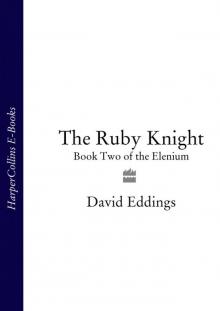 The Ruby Knight
The Ruby Knight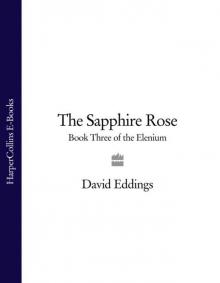 The Sapphire Rose
The Sapphire Rose King of the Murgos
King of the Murgos The Seeress of Kell
The Seeress of Kell Demon Lord of Karanda
Demon Lord of Karanda Pawn of Prophecy
Pawn of Prophecy Queen of Sorcery
Queen of Sorcery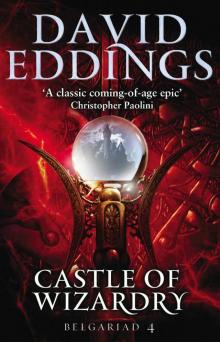 Castle of Wizardry
Castle of Wizardry Guardians of the West
Guardians of the West Sorceress of Darshiva
Sorceress of Darshiva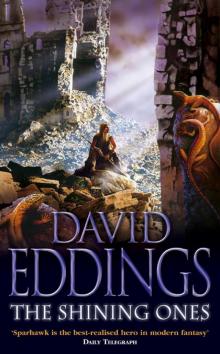 The Shining Ones
The Shining Ones Enchanters' End Game
Enchanters' End Game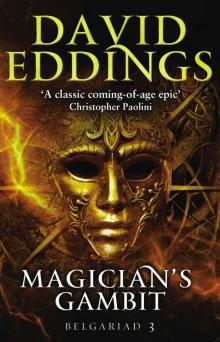 Magician's Gambit
Magician's Gambit High Hunt
High Hunt The Hidden City
The Hidden City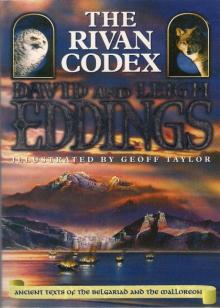 The Rivan Codex
The Rivan Codex Regina's Song
Regina's Song The Elder Gods
The Elder Gods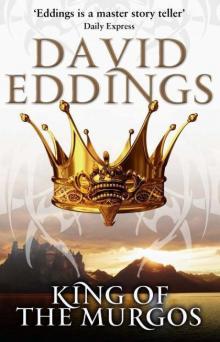 The Malloreon: Book 02 - King of the Murgos
The Malloreon: Book 02 - King of the Murgos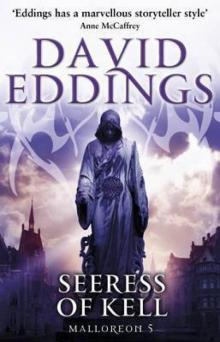 The Malloreon: Book 05 - Seeress of Kell
The Malloreon: Book 05 - Seeress of Kell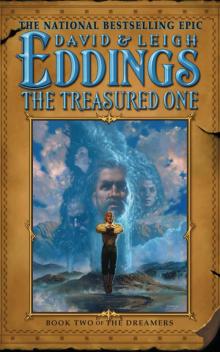 Treasured One
Treasured One The Malloreon: Book 04 - Sorceress of Darshiva
The Malloreon: Book 04 - Sorceress of Darshiva The Malloreon: Book 03 - Demon Lord Of Karanda
The Malloreon: Book 03 - Demon Lord Of Karanda Belgarath the Sorcerer and Polgara the Sorceress
Belgarath the Sorcerer and Polgara the Sorceress The Malloreon: Book 01 - Guardians of the West
The Malloreon: Book 01 - Guardians of the West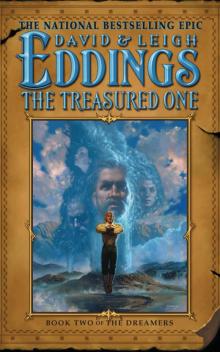 The Treasured One
The Treasured One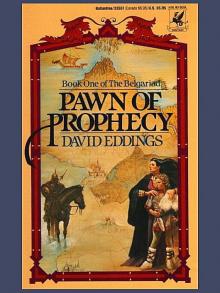 Pawn of Prophecy tb-1
Pawn of Prophecy tb-1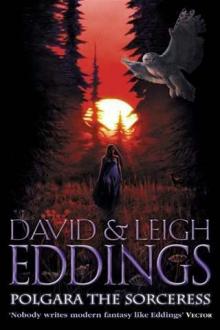 Polgara the Sorceress
Polgara the Sorceress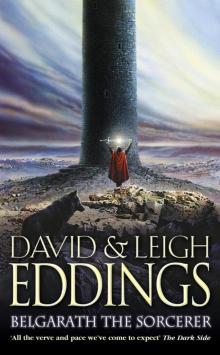 Belgarath the Sorcerer
Belgarath the Sorcerer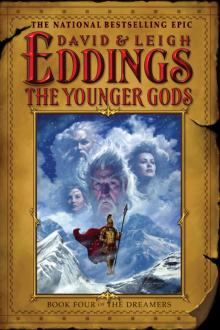 The Younger Gods
The Younger Gods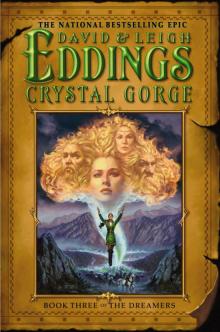 Crystal Gorge
Crystal Gorge